At my day job, we're using Webpack 2 to make our JavaScript as small as possible.
Bundle splitting ensures web apps get only the code they need, individual vendor files ensure caching stays as stable as possible, dead code elimination and tree shaking make our files small. Everything is minified and gzipped and cached forever. Fingerprinting ensures the code you download is never stale.
Despite all that, hitting our corp site, you're downloading 489KB of JavaScript. That's one of our most optimized apps. The apps that people use to work with our product are worse. Some go up to 1MB of gzipped JavaScript. 😅
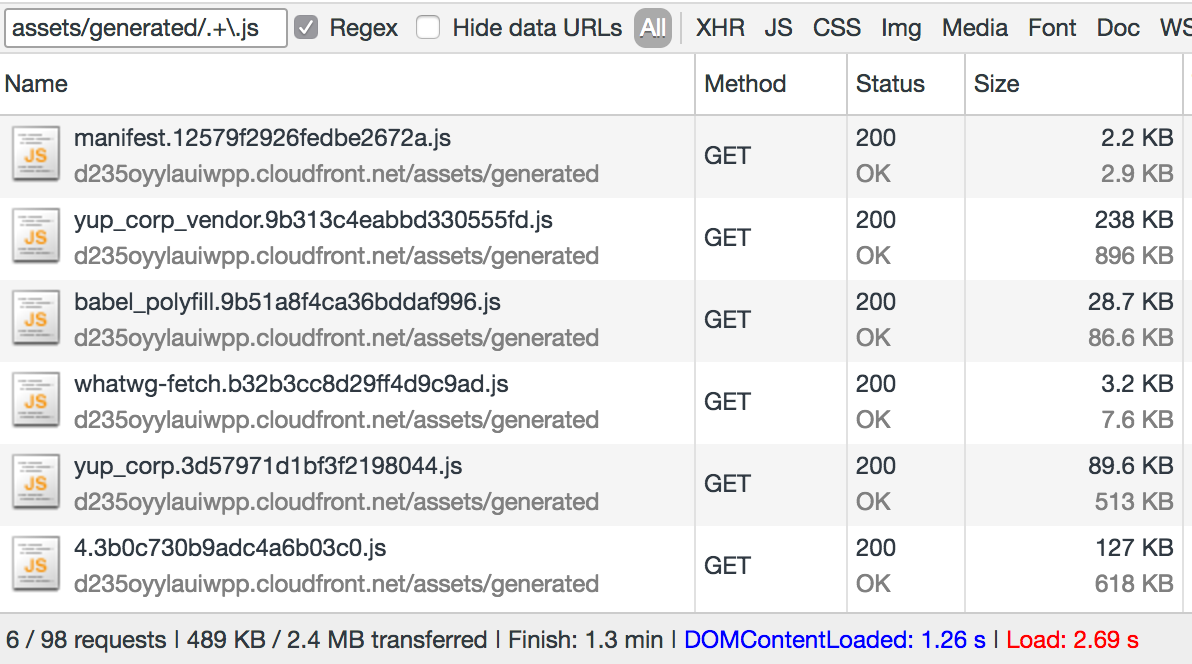
If you look at the BundleAnalyzerPlugin output of our Webpack build, you'll see why. The vendors file, all our dependencies, is 238KB of that footprint.
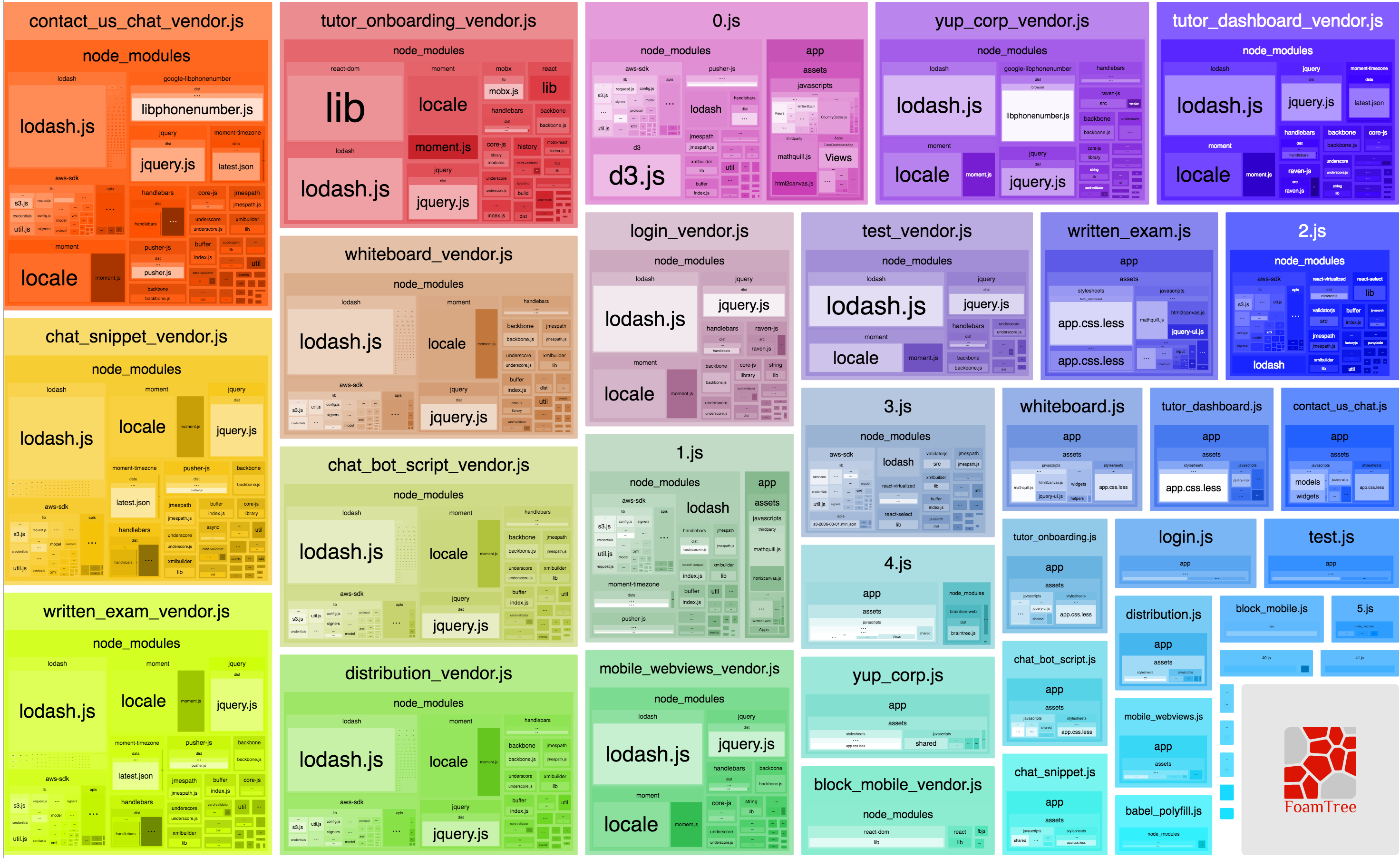
Lodash and Moment locales and jQuery everywhere! Most of the code we're shipping is made up of libraries which we use maybe 20% of.
We use 32 functions out of all of Lodash for example. I counted. We don't even use Moment locales!
Here's how I optimized that
Here's how I optimized that to take 55KB off our gzipped vendors file. At least for the corp site that is. Results in other apps vary :)
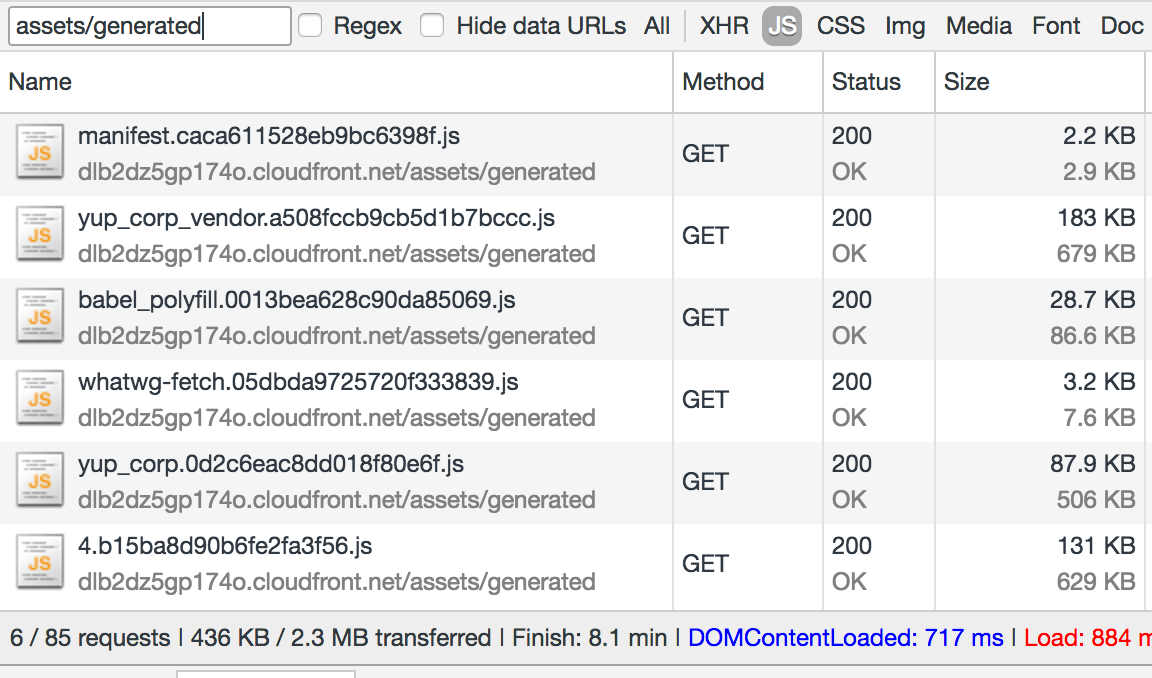
See, corp site vendors file is down to 183KB. Overall, JavaScript footprint is down by 53KB. Not bad for gzipped minified code.
Let's look at the unminified BundleAnalyzerPlugin output for our corp site.
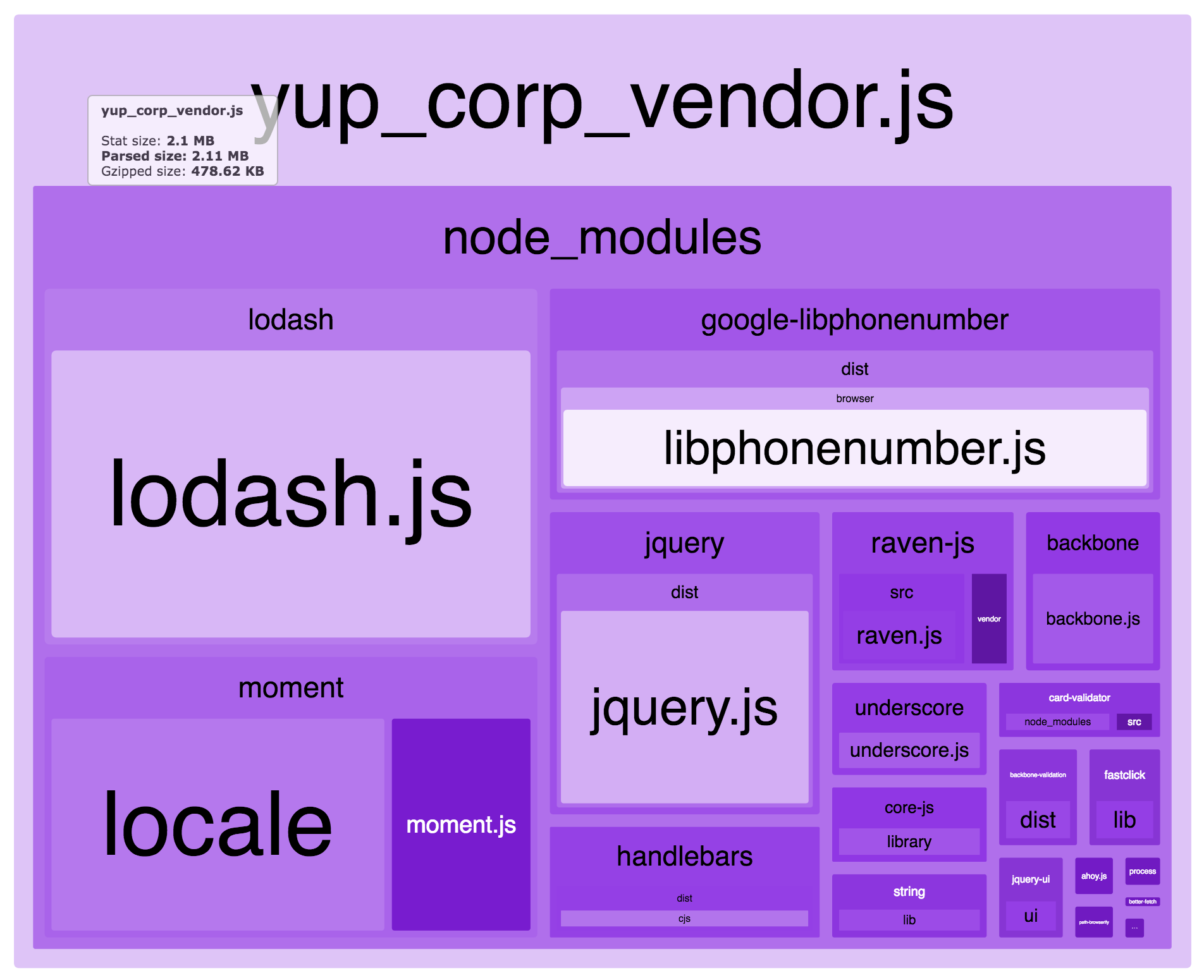
2.1 megs of unminified ungzipped code 😅
The first thing I did was to get rid of Moment's locales following a suggestion in this issue. Moment is unfortunately not modularizable. They've been working on it for 2 years, so the best you can do is to use the webpack.IgnorePlugin to remove them from your build.
Like this:
// webpack.config.js
// ...
plugins: [
// ..
new webpack.IgnorePlugin(/^\.\/locale$/, /moment$/),
];
I'm not sure how that works, but it removes most of what makes Moment big. We weren't using locales anyway; all our string formatting used explicit format strings.
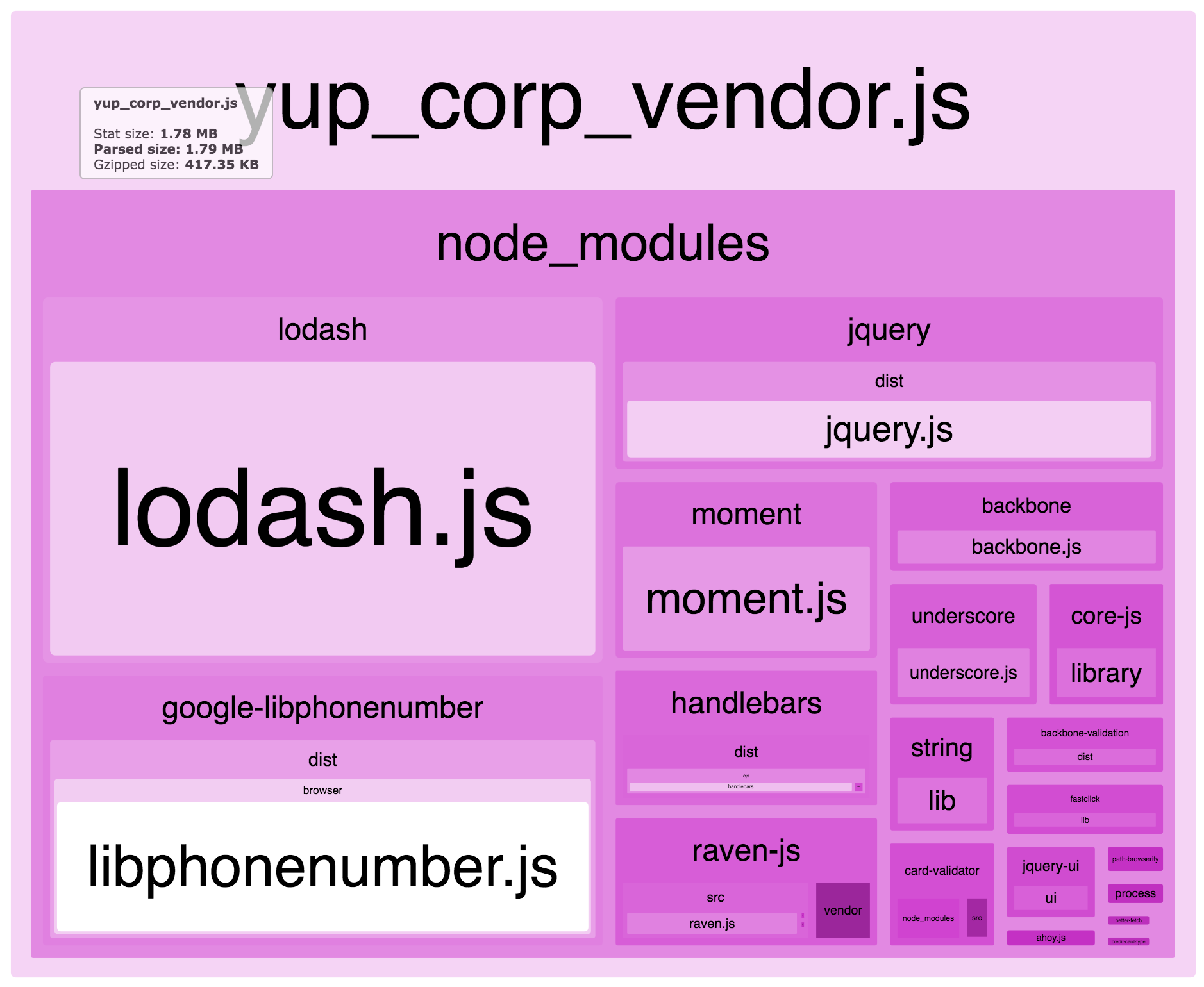
That was easy.
Smallifying Lodash, that made me feel cheeky. I ran a quick git grep to see how much of it we use. 32 functions. Out of well over 100 (200? More?) functions in the library.
But J Dalton is amazing and publishes Lodash as a series of modules. Each function has its own npm module.
Armed with my grep, I set to work. The goal:
-
import only those Lodash modules that are use d
-
install only those that are used
-
avoid manually having to manage Lodash dependencies
-
using
_.somethingLodashshould work without explicitly importing anything
Here's what I came up with:
// webpack.config.js
const LodashModules = (() => {
const path = require("path"),
execSync = require("child_process").execSync;
const files = path.resolve(__dirname, "./app/assets/javascripts"),
code = execSync(`grep -r "_\\\." ${files} --exclude=mathquill.js`, {
encoding: "utf-8",
});
const matches = new Set(code.match(/_\.([a-z]+)/gi));
return Array.from(matches.values()).map((m) => {
let module = m.replace("_.", "lodash.").toLowerCase(),
vars = [m];
if (module === "lodash.extend") {
module = "lodash.assign";
vars = vars.concat("_.assign");
}
if (module === "lodash.each") {
module = "lodash.foreach";
vars = vars.concat("_.forEach");
}
try {
require.resolve(module);
} catch (e) {
console.log(`Installing ${module}`);
execSync(`npm install --save ${module}`);
}
return new webpack.ProvidePlugin(_.fromPairs(vars.map((v) => [v, module])));
});
})();
// ...
plugins: [
// ..
new webpack.IgnorePlugin(/^\.\/locale$/, /moment$/),
].concat(LodashModules);
It's dirty, cheeky, and beautifully insane. It might be brittle, but I found no signs of brokenness. It's slow on first run and gets fast once all your modules are installed. Subsequent Webpack runs are just as fast as they've always been.
And yes, you definitely should test your app thoroughly after using this. Very thoroughly.
I think it's similar to J Dalton's babel-plugin-lodash in its core idea. To use only those parts of Lodash that you use.
It differs in how this goal is achieved. Dalton's plugin uses proper code analysis to find functions that are used and import them as lodash/<function> from a full install of Lodash.
My solution goes for modular installation as well modular usage. If I'm not mistaken, this is easier for Webpack to optimize.
And I think Dalton's plugin needs you to explicitly import Lodash when you use it. Mine turns it into a magic super global via webpack.ProvidePlugin.
In a nutshell, when you say _.map(stuff), my solution transforms that into require('lodash.map')(stuff).
Let me explain.
Find all occurrences of Lodash use
const LodashModules = (() => {
const path = require('path'),
execSync = require('child_process').execSync;
const files = path.resolve(__dirname, './app/assets/javascripts'),
code = execSync(`grep -r "_\\\." ${files} --exclude=mathquill.js`,
{encoding: 'utf-8'});
const matches = new Set(code.match(/_\.([a-z]+)/ig));
We run a grep -r "_\." <files> search as a shell command. This returns all lines in all our files that use Lodash. I'm excluding mathquill.js in my case because it's breaking convention and building its own old skool Lodash internally. Old library :)
With grep output in hand, we run a regex that extracts all occurrences of _.something. That means chaining doesn't work. If you're used to composing Lodash methods, you're fine; if you're not, you should get used to it.
babel-lodash-plugin also doesn't understand chaining by the way.
All occurrences of _.something are put in a Set. This removes any duplicates (of which there are many) and pares us down to 32 functions in my case.
Make magic imports
return Array.from(matches.values())
.map(m => {
let module = m.replace('_.', 'lodash.').toLowerCase(),
vars = [m];
if (module === 'lodash.extend') {
module = 'lodash.assign';
vars = vars.concat('_.assign');
}
if (module === 'lodash.each') {
module = 'lodash.foreach';
vars = vars.concat('_.forEach');
}
try {
require.resolve(module);
}catch(e) {
console.log(`Installing ${module}`);
execSync(`npm install --save ${module}`);
}
return new webpack.ProvidePlugin(
_.fromPairs(vars.map(v => [v, module]))
)
})
})();
When we have those unique Lodash function calls, we walk through them, and for each one we:
- get a clean module name,
module.replace ... - resolve aliases (the list is incomplete, it covers only what our codebase uses)
- try to import the module
- if it exists, move on
- if module doesn't exist, install it and save to package.json
- create a new
ProvidePluginentry for the module
The resulting ProvidePlugin entries are added to the plugins array in our overall config.
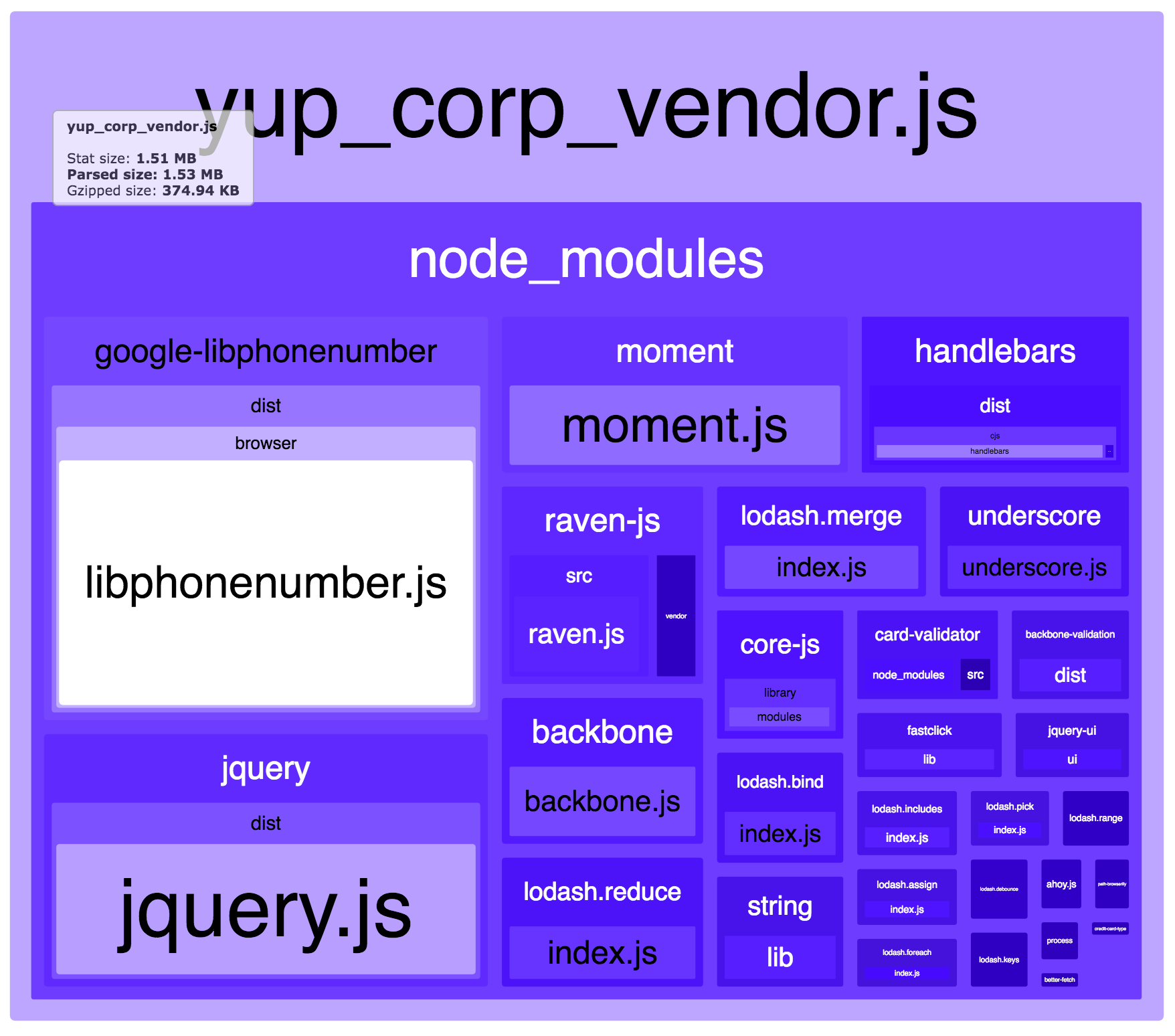
And that's how we removed 55KB of gzipped dependencies. I feel like an evil mastermind.
Use this in production carefully.
Got questions? Twitter me.
Continue reading about A dirty Webpack trick that reduced our gzipped bundle size by 55KB
Semantically similar articles hand-picked by GPT-4
- How We Used Webpack to Reduce Our JS Footprint by 50
- Migrating to Webpack 2: some tips and gotchas
- Webpack lazy loading on Rails with CDN support
- React components as jQuery plugins
- My biggest React App performance boost was a backend change
Learned something new?
Read more Software Engineering Lessons from Production
I write articles with real insight into the career and skills of a modern software engineer. "Raw and honest from the heart!" as one reader described them. Fueled by lessons learned over 20 years of building production code for side-projects, small businesses, and hyper growth startups. Both successful and not.
Subscribe below 👇
Software Engineering Lessons from Production
Join Swizec's Newsletter and get insightful emails 💌 on mindsets, tactics, and technical skills for your career. Real lessons from building production software. No bullshit.
"Man, love your simple writing! Yours is the only newsletter I open and only blog that I give a fuck to read & scroll till the end. And wow always take away lessons with me. Inspiring! And very relatable. 👌"
Have a burning question that you think I can answer? Hit me up on twitter and I'll do my best.
Who am I and who do I help? I'm Swizec Teller and I turn coders into engineers with "Raw and honest from the heart!" writing. No bullshit. Real insights into the career and skills of a modern software engineer.
Want to become a true senior engineer? Take ownership, have autonomy, and be a force multiplier on your team. The Senior Engineer Mindset ebook can help 👉 swizec.com/senior-mindset. These are the shifts in mindset that unlocked my career.
Curious about Serverless and the modern backend? Check out Serverless Handbook, for frontend engineers 👉 ServerlessHandbook.dev
Want to Stop copy pasting D3 examples and create data visualizations of your own? Learn how to build scalable dataviz React components your whole team can understand with React for Data Visualization
Want to get my best emails on JavaScript, React, Serverless, Fullstack Web, or Indie Hacking? Check out swizec.com/collections
Did someone amazing share this letter with you? Wonderful! You can sign up for my weekly letters for software engineers on their path to greatness, here: swizec.com/blog
Want to brush up on your modern JavaScript syntax? Check out my interactive cheatsheet: es6cheatsheet.com
By the way, just in case no one has told you it yet today: I love and appreciate you for who you are ❤️
